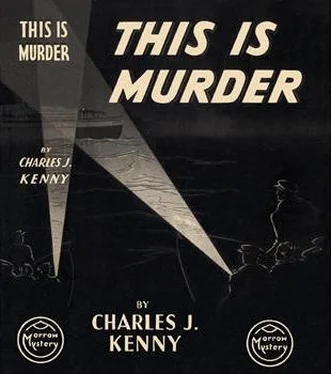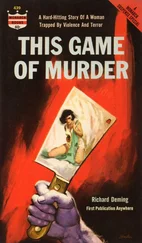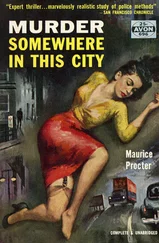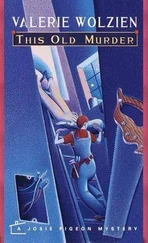Sudden dismay caused Morden’s jaw to sag. He blinked his eyes several times and said slowly, “I was with Carl Thorne. I was having a conference with him.”
Sam Moraine smiled and waved his hand.
“And now, Mr. Morden,” he said, “I think I’m quite even with you for that smash in the jaw. You may be excused as a witness, but don’t try to leave the building.”
Duncan jumped to his feet.
“Wait a minute,” he said. “We can’t stop here. Let’s get to the bottom of this.”
Moraine shook his head.
“Suppose,” he said, “you call Dr. Hartwell as your next witness.”
Duncan looked at Sam Moraine with pleading eyes.
“For God’s sake, Sam,” he said, “do you know what you’re doing, or are you just floundering around and pulling this extemporaneous stuff you pull in a poker game?”
Abruptly he realized how out of place the personal appeal was, and added hastily, “Would you mind explaining to the Grand Jury just what objective you have in mind?”
Moraine shook his head. “I’m only asking questions, trying to find out what happened. I have an idea, but I want to be certain before I make any specific accusations. When Dr. Hartwell was arrested, his personal property was taken from him and put in an envelope. Suppose we call Dr. Hartwell as a witness and also get his envelope from the custody of the jailer. There’ll be a knife in that envelope. Let’s look at the blade of that knife.”
“It’ll take a few minutes to get him here,” Duncan said dubiously. “We might fill in the time asking Morden additional questions.”
“I think,” Moraine suggested, “the members of the Grand Jury might like to take advantage of the situation to examine those documents.”
Duncan turned weary eyes toward the table on which the documents were being displayed. “Very well,” he said.
But the Grand Jury seemed to have lost much of their interest in the documents. They were watching Moraine with expressions of respect, of puzzled admiration, and Eaton Driver, foreman of the Grand Jury, arch political enemy of the Carl Thorne regime, supporter of John Fairfield as the next district attorney, was watching Phil Duncan with a thoughtful, speculative expression on his face.
Barney Morden, leaving the Grand Jury room, to wait with the other witnesses who had been examined and excused, turned to flash one last despairing glance at Sam Moraine. Only too well he appreciated Moraine’s cleverness and the ingenious manner in which that adroit individual had crashed home to the Grand Jury the joint motive which might have actuated both Thorne and Morden in killing Pete Dixon.
Dr. Hartwell took the oath and sat down in the witness chair. His manner was nervous, his eyes restless.
“You go ahead and examine him,” Phil Duncan said to Moraine. “He’s your witness.”
Moraine nodded, turned to face the dentist.
“You were the husband of Ann Hartwell?” he asked.
“She was my wife, yes, sir.”
“She was missing for a period of ten days or two weeks?”
“That’s right.”
“You had your suspicions about that disappearance, didn’t you?” Moraine asked.
“I didn’t think she was kidnapped, if that’s what you mean.”
“You thought she was staying with some man?”
Hartwell cleared his throat, lowered his eyes, and said in a muffled tone of voice, “She’s dead now. I won’t say anything against her.”
“But you got a gun and started out to find and kill the man in the case, didn’t you?”
“No, sir.”
“You came to my office, didn’t you?”
“Yes, sir.”
“And you had a gun?”
“Yes, sir, but I didn’t have it to kill anyone with.”
“What did you have it for?”
The witness was silent for several seconds. Then he said, “You took the gun away from me, took the shells out and dumped them in the wastebasket.”
“Exactly,” Moraine said. “And later on, at about ten forty-eight or ten forty-nine of the night of the murder, when I opened the door of my office, to step out in the corridor, you attacked me and tried to shoot me, didn’t you?”
“I stuck a gun at you but the gun wasn’t loaded,” Dr. Hartwell said. “That isn’t a crime — that is, it isn’t an assault with a deadly weapon. I didn’t try to club the gun, I tried to shoot you with an empty gun. You can’t hurt a man with an empty gun if you don’t club him with it.”
“Rather a technical distinction, isn’t it, Doctor?”
“It may be technical, but it’s right.”
“So you really weren’t guilty of any crime when you waylaid me there in the corridor?”
“I don’t think so, and my lawyer doesn’t think so.”
“That’s fine,” Moraine said, “but it did give you rather a perfect alibi, didn’t it, Doctor? What I’m getting at is that it established without any question where you were at ten forty-nine, or two minutes after the passenger train thundered past Pete Dixon’s residence.”
“You mean it showed that I couldn’t have murdered Dixon?”
“Yes.”
“Well,” Dr. Hartwell said, after a moment’s consideration, “I hadn’t thought of it in that light, but it does give me an alibi.”
“Yes,” Moraine said. “Now how long had you been there in the corridor waiting for me to leave my office?”
“For some little time.”
“How long?”
“I don’t know just how long, but Mr. Duncan, the district attorney, came into your office. I was there just a little bit before Mr. Duncan entered the building, and I waited for an opportunity to talk with you.”
“You mean an opportunity to kill me?”
“An opportunity to stick an empty gun in your ribs, if you want to express it that way,” Dr. Hartwell said.
“Exactly,” Moraine agreed.
“And you were there when Barney Morden came in, weren’t you?”
“That’s right.”
“Now then, the police were looking for you, weren’t they?”
“I believe so.”
“And, just before Phil Duncan entered my office,” Moraine said, “there was an officer sitting in a car in front of the building, watching everyone who came in. How did it happen that you got past him?”
“He didn’t see me, I guess,” Dr. Hartwell said, fidgeting uneasily.
“But,” Moraine went on, ‘“by the time Barney Morden had arrived, this officer had left. The assumption is that he left shortly after the district attorney came to my office. Now, if you had entered the office building a few minutes before Barney Morden entered it, the officer wouldn’t have been on duty, and you wouldn’t have been seen, so don’t you think you are mistaken as to just when you entered the building, Doctor?”
“No.”
Moraine smiled easily.
“Well, let’s look at it this way, Doctor. You came to town for the express purpose of finding where your wife had been. At first you thought she had been with me, but, during the day, you got in contact with other people and received a different idea.
“Now, Doctor, didn’t you discover that Tom Wickes intended to take your wife to Pete Dixon’s place at around ten o’clock the night the murder was committed; didn’t you go out there and wait in the shadows near Dixon’s house? When your wife showed up, didn’t you club her to death, and then go up the stairs and shoot Dixon? Didn’t you then go back downstairs, pick up your wife’s body, put it on the running board of your automobile, and drive to the railroad crossing, where you dumped off the body?
“Let’s figure it this way, Doctor: When you went to the Dixon house you were insane with jealous rage. You wanted to kill your wife, and you wanted to kill Dixon. You didn’t care what happened after that. But, after you had fired the shots which killed Dixon and realized you hadn’t alarmed the household, you saw an opportunity to frame an alibi, so you heated the blade of your pocket knife in the flame of the candle. As a dentist, you had frequently been called upon to cut wax with a hot knife. It was an easy matter for you, therefore, to cut an inch or two from the bottom of the candle. At the time, you just intended to cut off enough to make it appear the murder was committed a half hour or so later than was really the case. Then coincidence helped you, in that it happened you cut off just enough candle to make it appear the shots might have been fired when the ten forty-seven train was going by. Isn’t that so, Doctor?”
Читать дальше








